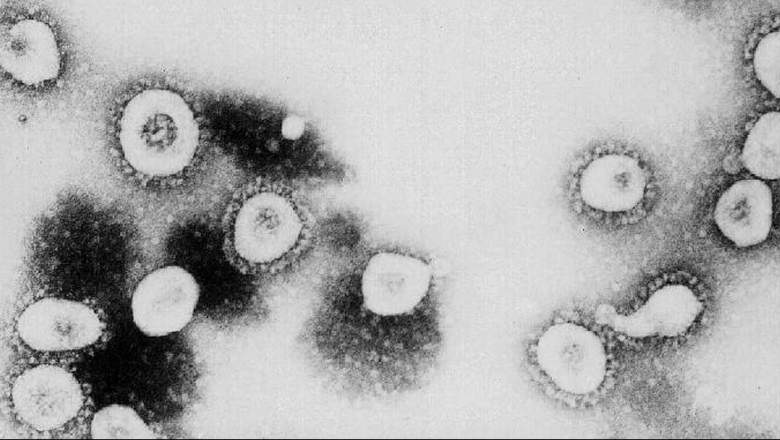
Getty This photo from the Centers for Disease Control and Prevention (CDC) shows a microscopic view of the Coronavirus.
A clinical trial at Northwell Health in New York is testing whether a heartburn drug, famotidine, might have any positive effect on COVID-19 patients. The drug is used in some over-the-counter remedies for heartburn, like Pepcid, and is now being investigated as a possible coronavirus treatment. However, there’s a long way to go before we would know if it holds any promise.
Northwell Health in New York City has been testing famotidine as part of a clinical trial since April 7, Science magazine reported. In the trial, patients with COVID-19 are receiving the drug intravenously in much higher dosages than the over-the-counter variety.
In total, 187 critical COVID-19 patients are enrolled, but the study hopes to enroll 1,174 people total over time.
Famotidine showed promise based on reports from China. Some models indicate it might bind to an enzyme in SARS-CoV-2, the novel coronavirus, Science reported. But as with other potential treatments, it is simply not known yet if this will be a workable treatment. Dr. Kevin Tracey, who’s in charge of Northwell Health’s research system, told Science that they’ll know in a few weeks if the treatment works.
Dr. Michael Callahan, an infectious disease doctor based at Massachusetts General Hospital, said he was investigating why some elderly but poorer people in China survived COVID-19 versus wealthier individuals of the same age, CNN reported. The doctors found that many of the poorer individuals were taking famotidine rather than a preferred but more expensive drug, omeprazole, for chronic heartburn and surmised that might have played a role. However, the results weren’t statistically significant, Science reported, so it still needs to be studied extensively.
What is Famotidine?
Famotidine is used primarily as an acid reflux or heartburn medicine, but it’s also an antihistamine. It’s found in over-the-counter medicines like Pepcid in tablet or chewable form, according to Healthline. There’s also a prescription form that comes as a liquid suspension taken orally, plus an injectable form given only by healthcare providers. Famotidine reduces the acid in your stomach, which can help with gastroesophageal reflux disease, syndromes where your stomach makes too much acid and certain ulcers. It’s a histamine-2 receptor blocker that reduces the amount of acid released in the stomach. It can have mild side effects like dizziness, constipation, headaches and diarrhea. In rare situations, it can have serious side effects like heart rate or rhythm problems, muscle problems, neurological symptoms, liver problems or skin problems.
Researchers Were Concerned About a Shortage of Famotidine
The study was not announced when it first started because researchers at Northwell wanted to make sure they had an adequate supply of famotidine and wouldn’t cause a run on the product, Science reported.
It took Northwell weeks to get half of the needed famotidine in sterile vials. Although researchers wanted to study only famotidine, because hydroxychloroquine was the standard treatment when the study launched, the trial has had to test a famotidine-and-hydroxychloroquine combination compared to hydroxychloroquine alone in order to recruit enough participants, according to Science. The control group consists of patients treated earlier. Tracey told CNN that hydroxychloroquine might not be used in the study in the future.
Famotidine is already in shorter supply since another heartburn drug, Zantac, was pulled from the shelves by the FDA in early April because of concerns of contamination, CNN reported.
Some supplies of the drug currently show as unavailable on Amazon, but it’s not known if this is because of the coronavirus news or because of Zantac being pulled. Some CVS and Walgreens locations are also out of stock.
Other areas are limiting how much you can buy so that there isn’t a shortage. One person on Twitter shared that Sams Club stores were limiting purchases to three.
Some people are having anecdotal success with the drug, Science reported. A 44-year-old woman who tested positive had a fever and was experiencing hypoxia. She treated herself with a megadose and the next morning, her oxygen levels were back to normal and her fever was gone.
At this time, it’s not clear if famotidine works as a COVID-19 treatment and, if it does, it would be administered in the intravenous form at a much higher dosage than the tablet form, Science reported.
READ NEXT: Daily COVID-19 Updates